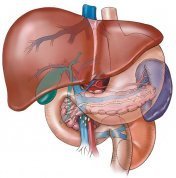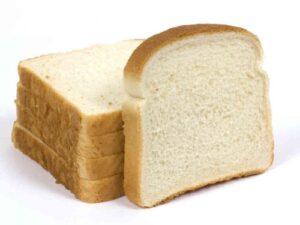Fatty liver disease is a condition characterised by excess fat in the liver. It's also called hepatic steatosis. You're more prone to get it if you drink much alcohol, or load up on the carbs too much. Too much alcohol or sugars causes fat to build up inside your liver cells over a period time, makes your liver's job less efficient and more difficult.

 The liver is one of your most important digestive organs that performs an incredible amount of life-sustaining activities. Your liver produces up to a pint of bile each day, a way of getting rid of waste from the body like old red blood cells. Bile also aids in digestion, but is also responsible partially for softening your stool, making it easier to pass motions. This is why many who have had their gallbladder removed (that stores the bile) have issues with their bowel. Your liver also produces proteins for the human body, and various dietary nutrients are converted into energy. The liver produces chemicals that aid in blood clotting (stick together to heal wounds), and also stores iron necessary for red blood cell production. By producing immunological components and eliminating bacteria and toxins and various substances from your blood, your liver aids in infection resistance.
The liver is one of your most important digestive organs that performs an incredible amount of life-sustaining activities. Your liver produces up to a pint of bile each day, a way of getting rid of waste from the body like old red blood cells. Bile also aids in digestion, but is also responsible partially for softening your stool, making it easier to pass motions. This is why many who have had their gallbladder removed (that stores the bile) have issues with their bowel. Your liver also produces proteins for the human body, and various dietary nutrients are converted into energy. The liver produces chemicals that aid in blood clotting (stick together to heal wounds), and also stores iron necessary for red blood cell production. By producing immunological components and eliminating bacteria and toxins and various substances from your blood, your liver aids in infection resistance.
 Liver toxicity is very common in Western countries, and I’d say that alcohol is one of the main causes, followed closely by an excess of refined carbohydrate foods, junk foods and especially foods high in sugars like soda drinks, ice cream, chocolate and candy.
Liver toxicity is very common in Western countries, and I’d say that alcohol is one of the main causes, followed closely by an excess of refined carbohydrate foods, junk foods and especially foods high in sugars like soda drinks, ice cream, chocolate and candy.
Your liver is your body’s largest organ, and the very quality of your life depends to a great deal on the health of your liver. Did you know that your liver determines how much weight you will carry, how much energy you will have and will even affect the quality of your sleep and moods? I have found that most patients I see in the clinic have very little idea how important their liver is to their health, until something goes wrong with their liver. Let’s look at the two main types of fatty liver, the symptoms, and then further and causes of fatty liver disease. Later on I’ll talk about how to get that liver cleaned-up.
There are two types of fatty liver disease, the alcoholic type and the non-alcoholic type. In the second case, fatty liver is often brought on by faulty ways of living and eating, especially refined foods, bad fats and excess food consumption.
Alcoholic fatty liver disease occurs as a result of extensive drinking. (One drink per day for women and up to two drinks per day for males is considered moderate drinking.) This type of liver disease affects around 5% of adults in the United States.
Nonalcoholic fatty liver disease (NAFLD) affects persons who do not drink, or drink mildly. According to a 2017 research review, NAFLD affects up Up to 25 to 30 percent of people in Europe and the USA have Nonalcoholic fatty liver disease. In the United States, one in every three adults and one in every ten children has the NAFLD. Although mainstream medicine says that “the cause of nonalcoholic fatty liver disease has yet to be discovered”, it is quite obviously lifestyle and diet related. According to a 2019 study “high consumption of carbohydrates (CHO), simple sugars, saturated fats, trans fat, animal protein (especially red meat), and processed food, and a low fibre intake are associated with NAFLD development.”
Fatty liver disease frequently causes no symptoms until it advances, sometimes right up to cirrhosis of the liver. Symptoms that you may experience include:
You will almost certainly know how you feel if you have drunk too much alcohol. Patients have asked me at times “how much is too much”, wanting to know how much wine they can drink before their liver’s health is affected. This is a most difficult question to answer, because every person is different and tolerance towards alcohol can vary greatly from person to person. I live in Hawke’s Bay, NZ, which is considered wine country and we see many patients who drink wine. Some drink one glass two to three times weekly, but many drink every day, and some in fact drink one to two bottles each night.
An article I wrote a few years ago you may like to read is all about the perils of alcohol Do You Think When You Drink. Most people know that alcohol is not really that good for their liver yet will drink moderate to heavy. Some people do not experience much harm from drinking alcohol, whereas others experience significant liver damage and may develop pancreatic problems, neuropathy (nerve damage), alcohol induced dementia or even be at at a much higher risk of developing several forms of cancer.
So what is a reasonable level of alcohol? According to guidelines, a safe alcohol intake is considered to be not more than 3 standard drinks a day for men and not more than 2 per day for women. Many people drink significantly more than this, particularly on the weekends or at special occasions such as at parties, and celebrations like birthdays and weddings.
 Binge drinking can cause serious harm and is not recommended. Are you trying to lose weight and drink alcohol regularly? You will find it very difficult to lose weight if you do, because alcohol is very high in sugars and places a real burden on your liver. Remember that each ml (or gram) of alcohol is equivalent to 7 calories, and every gram of fat is equivalent to 9 calories. Having a glass of wine is fattening, and almost the same as having that slice of your favourite cake; keep that in mind while trying to shed the pounds.
Binge drinking can cause serious harm and is not recommended. Are you trying to lose weight and drink alcohol regularly? You will find it very difficult to lose weight if you do, because alcohol is very high in sugars and places a real burden on your liver. Remember that each ml (or gram) of alcohol is equivalent to 7 calories, and every gram of fat is equivalent to 9 calories. Having a glass of wine is fattening, and almost the same as having that slice of your favourite cake; keep that in mind while trying to shed the pounds.
The majority of people who binge drink do not have a serious alcohol problem. Binge drinking, on the other hand, is a dangerous risk behaviour linked to significant injuries and a variety of disorders. It’s also linked to a higher chance of developing an alcohol use disorder.
 Many people know that fat and alcohol can affect their liver’s health adversely, but what they don’t know is that sugar is almost as bad. Sugar contains fructose, and this can be difficult for your liver to break down. A continual intake of sugar will allow your liver to manufacture fat, and the more sugar you regularly consume, the more fat your liver will make and store inside its cells, within time you will develop what is known as fatty liver.
Many people know that fat and alcohol can affect their liver’s health adversely, but what they don’t know is that sugar is almost as bad. Sugar contains fructose, and this can be difficult for your liver to break down. A continual intake of sugar will allow your liver to manufacture fat, and the more sugar you regularly consume, the more fat your liver will make and store inside its cells, within time you will develop what is known as fatty liver.
Once you have fatty liver, you are much more prone to developing metabolic syndrome, also called Syndrome X or insulin resistance. Having a fatty liver makes it very difficult indeed to lose weight (and to keep it off) and it places you at increased risk of Type 2 diabetes.
A study conducted in 2021 regarding NAFLD and diet concluded with “data supports a reduced content of free sugars, refined carbohydrates and saturated fat in the treatment of NAFLD.”
 Most patients I have seen don’t consider that they consume much sugar, but the unfortunate reality is that they are eating sugar continually throughout the day. I’m not referring to plain white refined sugar, most all the convenience foods you consume eventually get broken right down to glucose, including breads, biscuits, muesli bars, breakfast cereals, pasta, rice, sauces, potatoes and any food products made from refined white flour.
Most patients I have seen don’t consider that they consume much sugar, but the unfortunate reality is that they are eating sugar continually throughout the day. I’m not referring to plain white refined sugar, most all the convenience foods you consume eventually get broken right down to glucose, including breads, biscuits, muesli bars, breakfast cereals, pasta, rice, sauces, potatoes and any food products made from refined white flour.
Many people base their diets around the staples like bread, crackers, biscuits, white rice, pasta, noodles, refined breakfast cereals, and many other products made from refined white flour. Unless you have a continually high demand for the energy that carbohydrates give us, your liver will convert this excess sugar to fat. Now you can see that such a diet, along with a computer & internet connection can lead to obesity, including a higher likelihood of developing NAFLD.
To diagnose NAFLD, doctors may use any of these three types of tests:
You will have some form of liver damage, and it is important to get a professional opinion regarding your blood test results, because raised liver enzymes can be as a result of any different causes occurring inside your liver such as viral infections, excess alcohol, fatty liver, autoimmune disease, celiac disease and dysbiosis (SIBO, overgrowth of bad bowel bacteria).
 Whiskey and Camel Cigarettes
Whiskey and Camel CigarettesA liver biopsy, in which a small piece of liver is retrieved with a needle put through the skin into the liver, may be advised if advanced liver disease or another source of liver problems is suspected. My stepfather had repeated liver biopsies over the years, to measure how advanced his liver cirrhosis was. He was a whiskey drinker, one large bottle each day for as many years as I can remember. John loved his scotch, and smoked more than a pack of Camel cigarettes daily for more than forty years. His doctor smoked Camel too, so did everybody when I was a kid. John passed away in his early 60’s in 1998. A stroke got him in the end. He told me before he died (due to his drinking) that “it would take 2 days to put out the fire at the crematorium”. And that’s what was said at his funeral, hilarious. John enjoyed his life, and he was a great guy to know, but gripped with alcohol addiction. Smoking and drinking daily often spells a short life due to cancer or heart disease, most never make 65 in my experience without some serious health issue.
Is there a specific treatment for fatty liver disease? There is no specific treatment, instead, your health care professional can work with you to help you manage the causes and circumstances that contribute to your fatty liver. Your practitioner will likely also advise making lifestyle and diet modifications that can help you live a healthier life.
If you have fatty liver disease, I would advise you to make dietary changes to help treat the condition and reduce the risk of complications.
There are several ways to cleanse the liver, and one way to to go on a liver cleansing program. Living in the 21st century means having your liver exposed to a wide range of toxic substances including chemicals, hormones and antibiotics in food, environmental toxins in the air you breathe and the water you drink, as well as many other potential sources of toxins. Your liver is capable of breaking down toxins and excreting them from your body, but it is the constant level of toxic exposure on a day to day basis that overwhelms your liver’s ability to perform at its peak.
Regular annual liver cleansing makes sense, it will help you maintain your ideal weight (because your liver is the body’s main fat burner), it will also keep you in good overall health. A great way to achieve this is by following the diet recommendations above, and abstaining from all alcohol for a period of at least three months. During this time, focus on juices, increasing your exercise and water consumption.